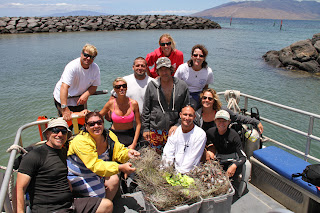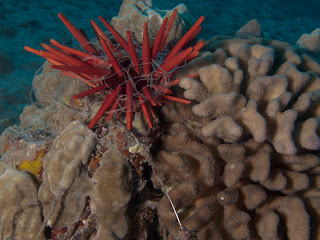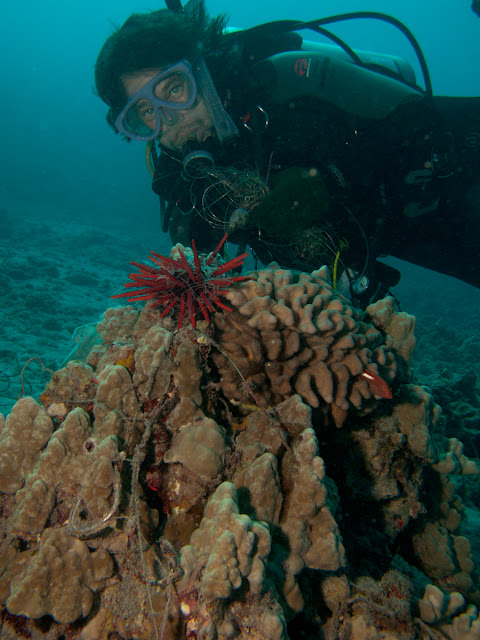The results are in! This was by far our most successful ocean cleanup in terms of how much debris was removed from the reef. This year Mike Severns Diving hosted our annual Earth Day Underwater Reef Cleanup Event, and their crew, plus the crew of Extended Horizons and a few select friends removed 374 pounds of trash and fishing tackle off the reef along the southern coast of Maui!!!
reef we cleaned was approximately 100 sq. ft.
but our bottom time wouldn’t allow.
Each time we hold an ocean cleanup, we try to target areas that are commonly fished. Often, these areas are often along rocky cliffs. Take a look at what we’re seeing underwater!
One common-sense answer is that sometimes when fishing, the fishing line breaks… however, in the areas that we clean, more often than not, the answer is that the fishing technique used is ‘slide-bait fishing.’ This requires use of ‘sacrificial’ lead grabbers and some monofiliment, called the ‘lead line.’ The combination of a cliff-like, rocky shoreline environment + the slide-bait fishing technique… the result is that the fishermen are unable to retrieve the debris that is intentionally left on the reef.
It is true, that if left long enough, all of the debris will become part of the reef… however, it may not end up being the type of reef it was initially! Things will gradually shift from a coral dominated reef to an algal dominated reef.
We’re talking about two components: monofiliment line & lead grabbers.
- The monofiliment fishing line tangles easily around the live corals. But it’s pretty thin and doesn’t really do any damage, right? Yes & No. The line itself isn’t what is harmful to the corals, although it does take upwards of 600 years for monofiliment to break down in the environment. The line creates spiderwebs criss crossing over the tops of lobe and finger corals, or bunches up like a baseball cap over the top of cauliflower coral heads… and the line is the perfect environment for algae to grow on. You see, those corals and algae are both looking to access the sunlight. With a ‘bonnet’ or ‘spiderweb’ of algae growing over them, the corals will not be successful, and often eventually die. Additionally, the algae grazers, such as urchins, also become tangled in the line… what is left becomes an algal dominated reef.
- The lead grabbers… might at first seem inert, and are often seen overgrown by corals… but recent documentation is revealing some startling effects where lead poisoning is traveling through the food chain. So do we really know for sure? Read more
From Googling “slide bait fishing” you can see that the target fish for this technique are giant trevally jacks. Here in Hawaii, fishing is a part of the culture, and the result of landing a big jack… you instantly become part of your community’s legends! So disallowing something so close to the heart of the community is not a viable solution.
Well, at the very least… getting groups out there to clean up the rubbish is step 1. Extended Horizons hosts cleanup events each Spring and Fall, in honor of Earth Day and International Coastal Cleanup Day. I’ve also heard about some eco-leaning fisherman choosing to use twine instead of monofiliment as their lead line (something more organic to be left behind). But the next step is to start taking a look as a community at this issue, and see if this is something we want to see change.
All in all… our reef cleanups are a half day, filled with lots of fun, lots of laughter, and a feel-good knowingness at the end of the day. Here is a silly video from Mike Severns Diving to show just how much good clean fun there is to be had at these events!





